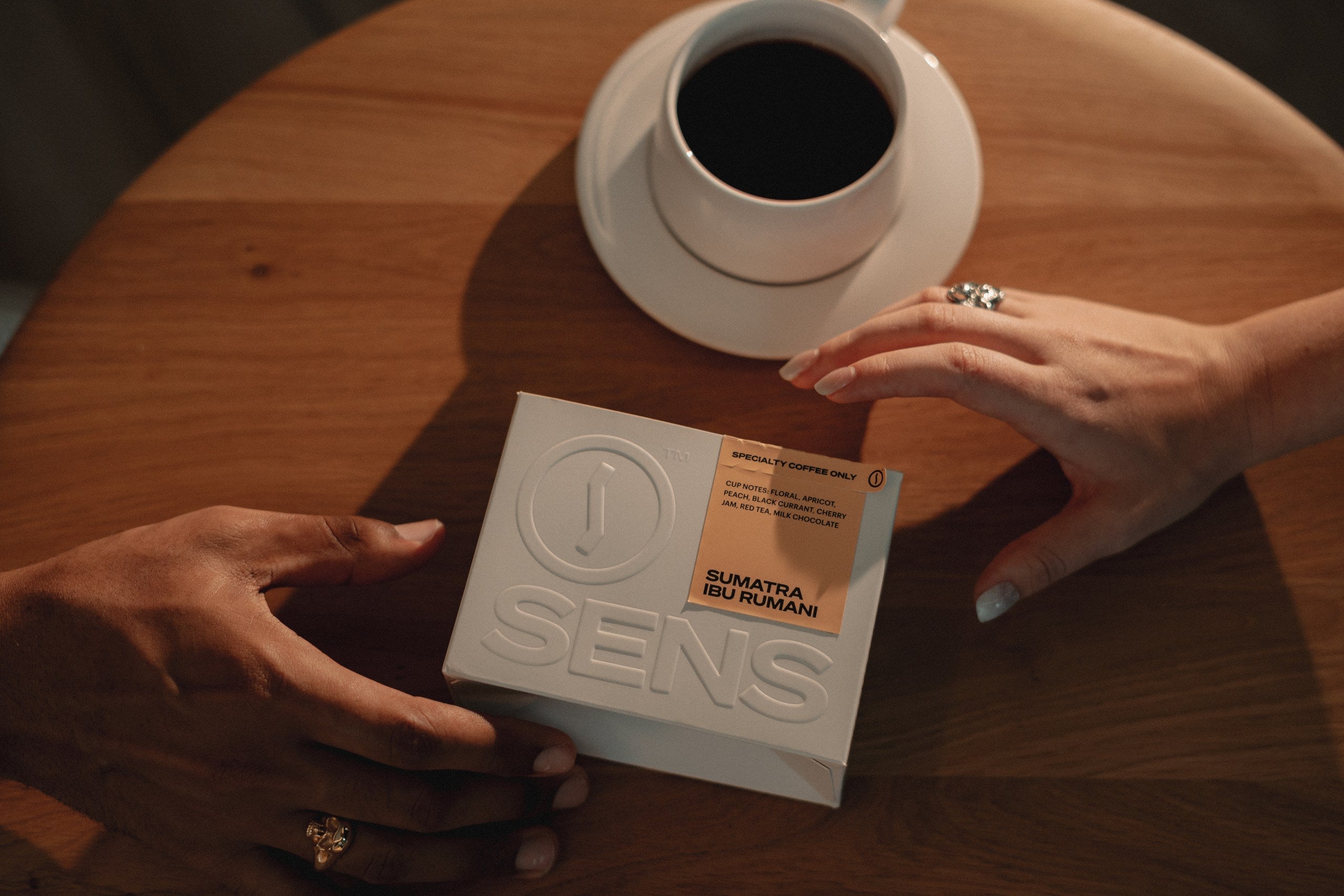
December 23, 2024
The Saudi Coffee Company is welcoming visitors to the opening of its specialty coffee brand JAZEAN’s latest store in Old Town AlUla.
Saudi Coffee Company connects modern-day coffee culture with its deeply rooted cultivation heritage, creating a unique coffee experience that celebrates the farm-to-cup journey through JAZEAN.
RIYADH, December 19, 2024: Saudi Coffee Company (SCC) has announced the launch of the second Experience Center and coffee shop by JAZEAN, its inaugural consumer coffee brand, in the Old Town of AlUla. The brand’s first location outside of Riyadh aims to provide visitors and tourists to the UNESCO World Heritage Site with a curated experience of the country’s centuries-old coffee traditions.
In addition to informing visitors about the cultivation and intricate roasting processes of coffee beans, the space offers customers a range of JAZEAN’s specially selected and expertly roasted coffees, each served amidst the breathtaking backdrop of AlUla’s famous landscape, a significant destination for culture, tourism, and heritage in Saudi Arabia.
As part of its offerings, JAZEAN features a barista bar, an aroma pause zone, a first model farm harvest product, a private majlis, and plentiful lounge seating, allowing guests to enjoy exceptional views of the AlUla canyon while exploring the unique flavors JAZEAN has to offer.
Speaking about the announcement, Mohammed Zainy, Chief Marketing Officer of Saudi Coffee Company, stated: “AlUla is the ideal destination for JAZEAN to celebrate the journey of coffee from seed to cup. Just as AlUla provides a window into this region's rich history, JAZEAN’s Experience Centers offer an authentic glimpse into the heart of Saudi culture and hospitality. We are thrilled to share this journey with visitors from across the nation and the world.”
JAZEAN, launched in 2023, is Saudi Coffee Company’s specialty coffee brand, created to rediscover and promote the origins of Arabica coffee, celebrate the coffee-drinking tradition integral to Saudi identity, and blend these histories with sustainable farming and roasting techniques.
Saudi Coffee Company, a PIF-owned enterprise, is committed to revitalizing Saudi Arabia’s coffee sector from seed to cup by empowering stakeholders across the full value chain. The company’s goal is to establish Saudi Arabia as one of the largest integrated coffee players in the world, ensuring a self-sufficient future for the local industry while sharing Saudi culture with the world.
AlUla, a UNESCO World Heritage Site in northwestern Saudi Arabia, is renowned for its breathtaking landscapes, ancient rock formations, and historical treasures like Hegra, Saudi Arabia’s first UNESCO-listed site. As a global destination for culture, heritage, and adventure, AlUla attracts visitors from around the world who come to explore its rich history, vibrant arts scene, and immersive experiences that blend modern luxury with the region’s storied past. The opening of JAZEAN’s space will coincide with the Winter in Tantora Festival, an annual cultural festival held in AlUla’s Old Town.

1st of January 2025
Hello 2025, hello Tokyo!
We have exciting news to share - MAME is coming to Tokyo!! After years of thinking about the idea, we felt it’s time. Aimed to be open in Spring 2025, we are thrilled to share our journey to Tokyo and keep you posted in this account🫘 STAY TUNED”
This thrilling announcement has coffee lovers and specialty coffee enthusiasts buzzing with excitement. MAME, known for its dedication to quality, craftsmanship, and a passion for coffee, is embarking on a new chapter by bringing its exceptional coffee experience to Tokyo. The expansion to one of the world's most vibrant coffee cultures is a testament to MAME’s vision of continuously pushing the boundaries of specialty coffee.
With a commitment to excellence, MAME has been a favorite among coffee connoisseurs, and this move to Tokyo signifies an exciting opportunity for even more people to experience their meticulously sourced and roasted beans. Tokyo, renowned for its appreciation of artisanal coffee and innovative café culture, is the perfect setting for MAME’s next big step.
As the launch approaches, coffee enthusiasts can expect behind-the-scenes updates, glimpses into the café’s development, and exclusive insights into what MAME has in store for its Tokyo debut. This expansion is not just about opening a new location—it’s about sharing the love of specialty coffee with a broader audience and embracing Tokyo’s dynamic coffee scene.
Spring 2025 can’t come soon enough, and fans of MAME are eagerly awaiting the chance to savor their favorite brews in a brand-new setting. Stay tuned for more updates as MAME Specialty Coffee takes its journey to Tokyo to the next level!

January 1, 2025 London, UK
A morning cup of coffee is a daily ritual for many, offering a refreshing start to the day. While some individuals, such as children and pregnant women, should limit their caffeine intake, recent research suggests that moderate coffee consumption can positively influence gut health.
A new study published in *Nature Microbiology* examined the effects of regular coffee drinking on gut microbiota. The research analyzed over 70,000 habitual coffee drinkers from the United States, the United Kingdom, and other countries, using extensive databases of blood and stool samples. The findings revealed that coffee drinkers had significantly higher levels of *Lawsonibacter asaccharolyticus* in their intestines compared to non-coffee drinkers. This trend was observed across different populations, sparking curiosity among scientists.
The study found that individuals who regularly consumed coffee had up to eight times more *Lawsonibacter asaccharolyticus* in their gut than those who abstained. While the precise health benefits of this bacteria are still being investigated, researchers confirm that coffee consumption significantly alters intestinal flora. The presence of this bacterium is associated with improved metabolism, reduced inflammation, and enhanced antioxidant properties, all contributing to overall well-being.
The increasing global coffee consumption provided researchers with a unique opportunity to compare microbiome differences between coffee drinkers and non-drinkers. The study’s large-scale analysis included nearly 23,000 participants from the U.S. and the U.K., along with over 54,000 individuals from diverse generational groups worldwide. By examining fecal samples, the researchers identified clear variations in gut bacterial composition based on coffee consumption habits.
Previous studies have also linked coffee to gut health. Research from Switzerland observed that individuals who drank three cups of coffee daily for three weeks experienced an increase in beneficial *Bifidobacteria*. Subsequent studies confirmed that regular coffee drinkers tend to have a more diverse and healthier gut microbiome.
A 2019 study conducted by Baylor University, presented at The American College of Gastroenterology Annual Meeting, further reinforced these findings. Researchers analyzed 97 intestinal biopsies from 34 healthy individuals and concluded that those who consumed more than two cups of coffee per day had a higher abundance of beneficial gut bacteria. These individuals also exhibited stronger anti-inflammatory responses and lower levels of harmful bacteria.
Experts attribute coffee’s gut health benefits to its rich antioxidant content, including chlorogenic acid and polyphenols, which support the growth of beneficial bacteria. The collection of biopsy samples directly from intestinal mucus provided a comprehensive understanding of coffee’s impact on digestive tract microbiota. Additional studies suggest that coffee fosters an intestinal environment conducive to the proliferation of high-quality, health-promoting bacteria, enhancing digestion and even emotional well-being.
Dr. Astrid Nehlig, an honorary research director at the French Institut National de la Santé et de la Recherche Médicale, highlighted in the medical journal *Nutrients* that coffee consumption significantly influences gut microbiota composition. She noted that coffee promotes the presence of *Bifidobacterium*, which helps maintain bacterial balance and supports overall health.
Given these findings, incorporating coffee into your daily routine within a moderate range can be a beneficial addition to a healthy lifestyle. Enjoying a cup in the morning or afternoon not only enhances mental alertness and mood but may also contribute to better gut health. Whether you are already a coffee enthusiast or considering adding it to your diet, this research supports the idea that coffee can be a valuable part of a wellness-focused lifestyle.

22 January 2025
Oil and base metals faced renewed pressure as tariff threats from the United States raised concerns across global markets.
In the energy sector, the focus is shifting from sanctions on Russia to potential trade policies under President Trump. Brent crude fell below $80 per barrel as the president reiterated his threat to impose a 25 percent tariff on imports from Canada and Mexico by February 1. Additionally, overnight comments about a potential 10 percent tariff on imports from China in response to fentanyl-related issues have contributed to the downward pressure on oil prices during early Asian trading. Trade tensions and the risk of retaliatory measures continue to be significant factors influencing the market.
The European natural gas market saw a sharp increase, with TTF prices rising by more than 4.5 percent to exceed €50/MWh, the highest level since the start of 2025. This was driven by an outage at the Freeport LNG export terminal in the United States, which remains shut due to power issues amid freezing weather. The facility, which has a capacity of over 20 bcm, has added further strain to the European market as the region works to offset reduced Russian pipeline flows. EU gas storage levels have dropped to 59 percent, and efforts to maintain storage above the European Commission’s target of 50 percent by February 1 remain a priority. Germany is reportedly considering subsidies to encourage gas storage refills ahead of the 2025/26 winter, although the TTF forward curve shows little incentive for players to store gas at current prices.
In metals, base prices fell as President Trump announced plans to impose tariffs of up to 25 percent on imports from Mexico and Canada by February 1. The president also mentioned the possibility of universal tariffs on all imports but indicated he was not ready to implement them immediately. These developments have raised concerns about the potential for renewed global trade conflicts, increasing downside risks for industrial metals markets.
In agriculture, Brazil’s agriculture agency, CONAB, lowered its coffee production estimates for the 2024/25 season due to adverse weather conditions at the end of 2023. Total coffee output is now expected to decline by 1.6 percent year-on-year to 54.2 million bags, down from an earlier estimate of 54.8 million bags. Arabica production estimates were largely unchanged at 39.6 million bags, up 1.8 percent from last season. However, robusta production estimates fell to 14.6 million bags, representing a 9.6 percent year-on-year decline. Market attention is now focused on the 2025/26 crop, with concerns growing over the impact of dry weather throughout 2024.
Soybean production in Brazil is expected to rise significantly. The Brazilian Association of Vegetable Oil Industries (ABIOVE) projects a 11.9 percent year-on-year increase to 171.7 million metric tons in 2025, up from a previous forecast of 168.7 million metric tons. Soybean exports for 2025 are estimated at 106.1 million metric tons, while ending stocks for 2024 have declined by 22 percent to 3.6 million metric tons.
Across commodities markets, the growing threat of tariffs and geopolitical risks continue to drive volatility, with potential long-term impacts on supply chains and global trade dynamics.

January 17, 2025 — 11:44 pm
On January 17, 2025, coffee prices climbed, with March arabica coffee increasing by 0.49 percent and March robusta coffee surging by 2.78 percent to reach a two-week high. Robusta prices led the gains as concerns about reduced supply from Vietnam, the world’s largest robusta producer, intensified. The upcoming Lunar New Year holiday in Vietnam, which typically disrupts coffee supply chains, added to the market's apprehensions.
Arabica prices also gained momentum earlier this week, reaching a three-week high due to dry conditions in Brazil. Somar Meteorologia reported that the Minas Gerais region, Brazil’s largest arabica-producing area, received only 31 percent of its historical average rainfall last week. This prolonged dry weather, driven by El Niño, continues to impact coffee tree health and poses risks to Brazil's 2025/26 arabica crop. Brazil is currently experiencing its driest conditions since 1981, according to the natural disaster monitoring center Cemaden. Similarly, Colombia, the second-largest arabica producer, is recovering from droughts linked to El Niño.
Vietnam’s robusta production has faced significant challenges due to prolonged droughts. Output for the 2023/24 season fell by 20 percent to 1.472 million metric tons, the lowest in four years. The USDA forecasts a slight decline in Vietnam’s 2024/25 robusta production to 27.9 million bags. Meanwhile, Vietnam’s coffee exports dropped by 17.1 percent year-on-year in 2024, though the Vietnam Coffee and Cocoa Association raised its production estimate for the 2024/25 season to 28 million bags.
Global coffee exports have risen, adding bearish pressure to the market. The International Coffee Organization reported a 15.1 percent year-on-year increase in exports for October, the start of the 2024/25 season, while total exports for 2023/24 climbed by 11.7 percent to 137.27 million bags. Cecafe’s recent data showed Brazil’s 2024 coffee exports reached a record 46.3 million bags, including a 20 percent increase in arabica exports and a 98 percent surge in robusta exports.
Despite these bearish factors, longer-term market concerns remain. Drought conditions in Brazil have led to reduced crop estimates, with Volcafe projecting a significant deficit of 8.5 million bags for the 2025/26 season. The consultancy group Safras & Mercado has also predicted a 5 percent year-on-year decline in Brazil’s 2025/26 coffee crop to 62.45 million bags, with arabica production expected to fall by 15 percent.
While robust global exports are currently weighing on prices, the long-term impact of drought and reduced production in key regions may provide future support. The coffee market remains in a delicate balance between short-term supply surpluses and long-term production challenges.

Thu Jan 16
Coffee prices saw a notable drop on Thursday, January 16, as record-high coffee exports from Brazil weighed on the market. March arabica coffee closed down 1.00%, while March robusta fell 0.47%.
Key Factors Driving Price Declines:
- Record Brazilian Exports: Cecafe reported Brazil’s 2024 arabica exports surged 20% year-on-year to a record 37 million bags, while robusta exports jumped 98% to a record 9.4 million bags.
- Increased Inventories: ICE-monitored arabica inventories hit a 2.5-year high of 993,562 bags, while robusta inventories reached a 3-month high of 4,415 lots.
- Vietnam’s Robust Export Growth: Vietnam's December coffee exports rose 102.6% year-on-year, contributing to a two-week low for robusta prices earlier this week.
Market Trends and Supply Concerns:
- Global Supply Pressures:While record exports are bearish for prices, dry weather in Brazil continues to impact long-term production. Minas Gerais, the largest arabica-growing region, received only 31% of its historical average rainfall last week, further exacerbating drought concerns.
- El Niño Impact: The dry conditions in South and Central America, including Brazil and Colombia, threaten future arabica yields. Vietnam, the world’s largest robusta producer, also faces reduced output due to prolonged drought.
Mixed Production Outlooks:
- Global Coffee Surplus: The International Coffee Organization (ICO) reported a surplus of 1 million bags for the 2023/24 season, with global production up 5.8% year-on-year to a record 178 million bags.
- Brazil’s Future Crop Estimates: The USDA’s December report projected a smaller Brazilian coffee crop at 66.4 million bags for 2024/25, with ending stocks falling to a 24-year low.
Long-Term Price Support:
Despite the current bearish factors, the outlook for reduced arabica production in Brazil due to extended droughts and El Niño weather patterns may provide long-term support for coffee prices. Analysts also anticipate a global arabica deficit in 2025/26, marking the fifth consecutive year of supply shortages.
As global coffee markets face both immediate pressures from record exports and long-term supply risks, industry players will need to carefully navigate ongoing volatility. Stay updated for the latest insights and analysis.

January 17, 2025 – By Reuters
Starbucks CEO Brian Niccol announced plans to implement job cuts as part of the company’s broader turnaround strategy. The restructuring will focus on optimizing support teams globally but will not affect in-store staff or investments in store hours, ensuring continued commitment to customer service.
Details of the job cuts are expected by early March. Niccol, who previously led Chipotle Mexican Grill and is now four months into his role at Starbucks, emphasized that the company's large size and organizational structure often hinder efficiency. He noted issues such as excessive layers of management and roles primarily focused on coordinating work.
Facing increased competition and softening demand in key markets like the U.S. and China, Starbucks has introduced several initiatives to improve operations. These include plans to revamp U.S. stores by adding comfortable seating, ceramic mugs, and a coffee-condiment bar, aiming to reduce customer wait times to under four minutes.
The company, which suspended its fiscal year 2025 forecast in October, is striving to adapt to changing consumer preferences while maintaining its global presence.
In related news, Mellody Hobson, Starbucks' lead independent director, announced her retirement after nearly 20 years with the company.
Stay tuned for more updates on Starbucks’ progress and its impact on the coffee industry.

January 24, 2025
Weekly Coffee Insights: Market Trends & Updates
Editor’s Note:
This week, Brazil's 2024-25 coffee harvest projection was reduced by 600,000 60kg bags, according to Conab, part of the Brazilian Ministry of Agriculture, Livestock and Food Supply. The adjustment, driven by ongoing adverse weather conditions, aligns with industry expectations.
Production in Minas Gerais, Brazil’s largest arabica-producing state, has declined compared to the previous harvest, while robusta yields nationwide fell by 9.6% from the 2023-24 season.
As the world’s top coffee producer, fluctuations in Brazil’s output significantly impact global markets. The reduced harvest forecast could push coffee futures higher, contributing to market uncertainty for producers, traders, and roasters alike.
Currently, the C price hovers near US $3.40/lb, reflecting the growing demand for reliable, affordable coffee. Meanwhile, consumer interest in high-end, distinctive coffee lots continues to thrive.
Access to these exclusive coffees remains a challenge for some roasters, but virtual and hybrid auctions have emerged as valuable tools. On February 10 and 11, M-Cultivo and the DMCC will host the Dubai Coffee Auction, offering global roasters a unique opportunity to secure exceptional lots from top producers.
In today’s competitive market, specialty coffee brands must balance affordability with exclusivity. By providing accessible, reliable options alongside premium, high-quality lots, brands can stand out and navigate the industry’s ongoing challenges.
Stay tuned for more updates on the latest coffee industry developments!

The Coca-Cola Company has reported a decline in volumes for its Costa Coffee brand in 2024, attributing the downturn to increased competition and reduced consumer confidence in the UK market. The beverage giant, which acquired Costa Coffee for $4.9 billion in January 2019, noted that while its overall group revenue grew by 3% year-on-year to $47.1 billion, its coffee segment experienced a 3% decrease in volume over the same period. This decline was primarily linked to Costa Coffee's performance in the UK.
The UK coffee shop sector is currently navigating a challenging environment characterized by heightened competition and cautious consumer spending. According to World Coffee Portal's annual survey, price sensitivity has emerged as the most significant consumer trend in the UK's branded coffee shop market. The survey also revealed that the proportion of industry leaders reporting sales growth of 5% or more over the past year decreased from 54% to 37%, while those reporting a decline in sales increased from 13% to 24%.
In response to these market conditions, Costa Coffee closed a net total of six UK stores in the past year, leading to a 1.3% reduction in its market share, which now stands at 23.3%. Despite these challenges, Costa Coffee remains the UK's largest branded coffee chain, operating over 2,670 stores and 15,000 self-serve coffee machines nationwide.
Internationally, Costa Coffee is pursuing an ambitious expansion strategy. The brand currently operates 1,500 outlets and 1,600 self-serve units across 50 international markets. In 2024, it entered new markets by opening its first coffee shops in Belgium and Italy and significantly increased its presence in key growth regions such as Saudi Arabia and India.
Despite current challenges, Costa Coffee continues to enjoy strong brand loyalty in the UK, having been voted 'The Nation's Favourite Coffee Shop' for 15 consecutive years by an independent panel of over 5,000 UK coffee shop consumers.

The World of Coffee event in Dubai has underscored the coffee industry's dedication to sustainable practices. The event featured a range of initiatives aimed at promoting environmental responsibility and social equity within the coffee sector.
A key highlight was the emphasis on regenerative agriculture, which focuses on restoring soil health, enhancing biodiversity, and improving water management. This approach not only benefits the environment but also supports farmers by increasing crop resilience and yield.
The event also showcased advancements in circular economy practices, such as waste reduction and resource reuse. Innovations included compostable packaging solutions and systems for recycling coffee by-products, aiming to minimize the industry's environmental footprint.
Additionally, discussions highlighted the importance of transparency and traceability in the coffee supply chain. By implementing robust tracking systems, stakeholders can ensure ethical sourcing and provide consumers with information about the origin of their coffee.
The World of Coffee Dubai 2025 served as a platform for industry leaders to share knowledge and collaborate on strategies to foster a more sustainable and equitable future for coffee production and consumption.

The World of Coffee event in Dubai has underscored the coffee industry's dedication to sustainable practices. The event featured a range of initiatives aimed at promoting environmental responsibility and social equity within the coffee sector.
A key highlight was the emphasis on regenerative agriculture, which focuses on restoring soil health, enhancing biodiversity, and improving water management. This approach not only benefits the environment but also supports farmers by increasing crop resilience and yield.
The event also showcased advancements in circular economy practices, such as waste reduction and resource reuse. Innovations included compostable packaging solutions and systems for recycling coffee by-products, aiming to minimize the industry's environmental footprint.
Additionally, discussions highlighted the importance of transparency and traceability in the coffee supply chain. By implementing robust tracking systems, stakeholders can ensure ethical sourcing and provide consumers with information about the origin of their coffee.
The World of Coffee Dubai 2025 served as a platform for industry leaders to share knowledge and collaborate on strategies to foster a more sustainable and equitable future for coffee production and consumption.

Australian appliance manufacturer Breville Group has announced a 10.1% increase in revenue for the six months ending December 31, 2024, totaling AU$997.5 million (US$626 million). Net profit also rose by 16% to AU$98 million (US$61.5 million). This growth is largely attributed to a surge in global demand for home coffee machines.
The company, known as Sage in Europe, reported double-digit sales growth in its coffee segment across the Americas, Asia Pacific, and EMEA regions. To capitalize on this momentum, Breville is expanding its Beanz e-commerce platform, which connects specialty coffee roasters with consumers. Since its launch in 2021, Beanz has shipped 1.3 million units of packaged coffee from over 100 roasters, with a 71% increase in per kilogram sales over the past year.
In January 2025, Breville established a new Middle East headquarters in Dubai to meet the growing demand for premium home coffee machines in the region. The company plans to sell its Sage and Lelit coffee machine brands across the UAE, Saudi Arabia, Oman, Kuwait, and Qatar. Additionally, Breville is preparing to open a Shanghai headquarters, along with sales offices in Shenzhen and Hong Kong, to enhance its presence in China's expanding home coffee market.
CEO Jim Clayton highlighted the company's strategic move to diversify its supply chain by shifting production out of China to mitigate potential tariff impacts. This initiative, which began three years ago, aims to reduce the company's reliance on Chinese manufacturing to just 10% by early 2026. Clayton emphasized that this strategy is designed to enhance business resilience, regardless of the U.S. political climate.
Despite challenges such as U.S. trade policy dynamics and cash flow impacts due to stockpiling, Breville remains focused on growth. The company is exploring new markets, including plans to introduce its Sage, Baratza, and Lelit coffee machine brands in China, and has initiated direct entry into the Middle Eastern market via its Dubai office.
The company's Beanz service has been particularly successful, shipping more than 1.3 million bags of coffee to 145,000 customers and experiencing a 71% growth in the first half of the fiscal year. Clayton noted that Beanz is a fundamental component that enables customers to make café-quality coffee at home.
Breville's low debt leverage provides flexibility for further investment in inventory as a cost hedge and supports plans for continued expansion. The company remains committed to its diverse growth strategies and product expansions to maintain momentum and address market uncertainties.

